How Ukraine Still Fights High Level Corruption While Fighting The Invasion of Russia
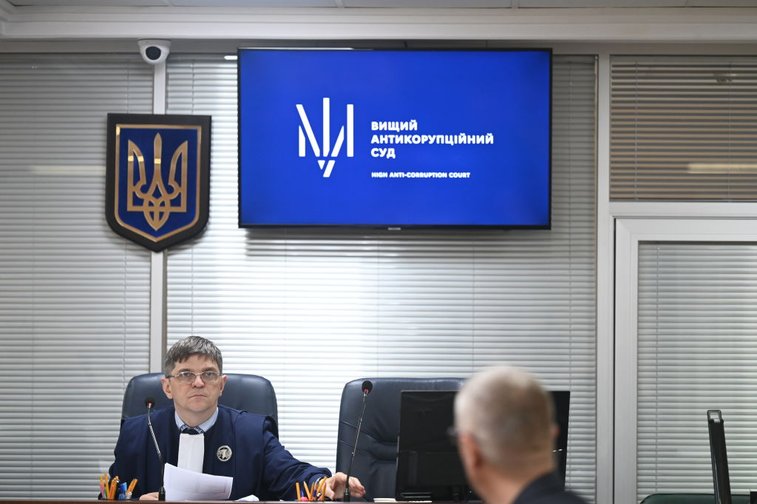 |
| (c) Anadolu Agency / Contributor | May 2023: Ukraine's Higher Anti-Corruption Court hears a case regarding the former head of the Supreme Court |
The fight against corruption and impunity from justice was a key driver of Ukraine’s Euromaidan revolution in 2014, as people rebelled against state capture. But while efforts to embed anti-corruption measures in the country’s institutions had some success in subsequent years, the public often criticized government organizations for their inaction.
Now, the state’s anti-corruption bodies are tackling wartime fraud, and also resurrecting prominent investigations and prosecutions after years in apparent limbo.
Just last month, Vsevolod Kniaziev, head of Ukraine’s Supreme Court, was detained and charged over alleged bribery. A few weeks later, a famous Kyiv judge, who had made headlines after disappearing to Moldova before being kidnapped and brought back to Ukraine, was sentenced to ten years in prison. He was first charged back in 2016. Vadym Valko, a lawyer at the Centre for Combating Corruption NGO, told openDemocracy that Ukraine is doing well to fight corruption with “fewer resources”, as prosecutors and investigators have joined the Ukrainian military.
“Show me one other country in the world that, during a full-scale war, with destroyed infrastructure, with obviously big internal problems, is not just fighting corruption – [but showing] better results than before the war,” he said.
Still, some key reforms are yet to be completed. And the fate of Ukraine’s democracy now depends on successful judicial reform and fair competition for selecting judges to join the country’s Constitutional Court.
How was corruption tackled in Ukraine after the Euromaidan revolution?
Ukraine’s anti-corruption reforms have been underway for seven years now. After the Euromaidan revolution in 2014, and with the help of international partners, the country has adopted anti-corruption legislation and formed four new bodies to fight corruption.
These are the National Anti-Corruption Bureau of Ukraine (NABU), the Specialised Anti-Corruption Prosecutor's Office (SAP), the National Agency for the Prevention of Corruption (NACP), and the Higher Anti-Corruption Court of Ukraine (SAC). They have different responsibilities but work together – for example, NABU conducts investigations, which are then handed over to SAP to prosecute.
However, this new system clashed with the old one, and at first, NABU investigators faced a lot of obstacles in their work.
According to Valko, the joint work of SAP and NABU was basically blocked a few years ago after the then-head of SAP, Nazar Kholodnytskyi, resigned. The competition for a replacement dragged on for several years, until SAP’s new director – Oleksandr Klymenko, a former NABU investigator – finally took up his post in July 2022.
“The competition [for the post] was very difficult, there was a lot of political influence and pressure,” explained Valko. “But in my personal opinion, in the end we got an independent head of SAP, who will definitely not follow instructions from the top, whether from the general prosecutor’s office or the president’s office.”
Earlier this year, NABU also got a new director (after the previous incumbent finished his seven-year term of office): Semen Kryvonosov, former head of the country’s urban planning inspectorate.
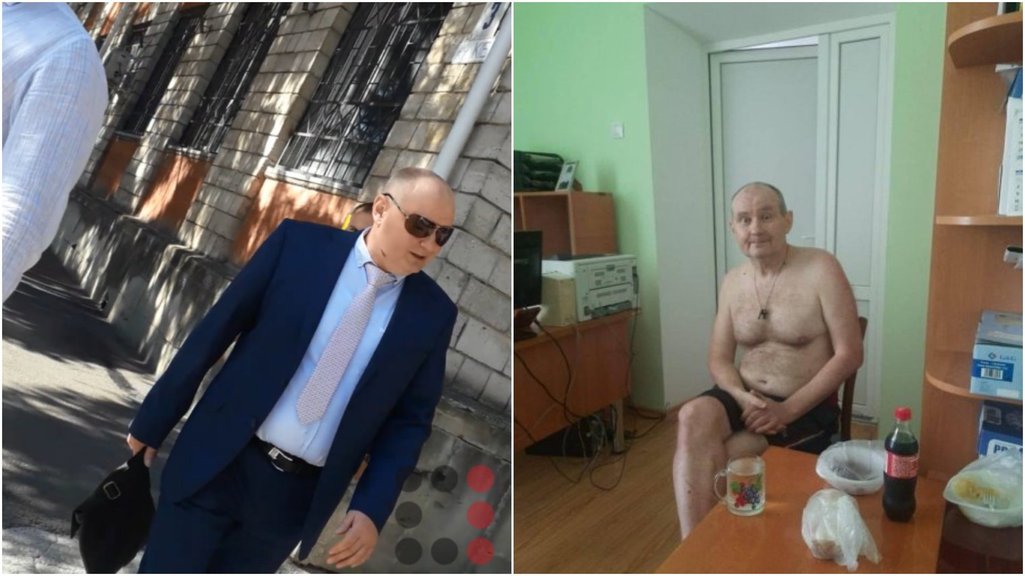 |
Former Kyiv district judge Mykola Chaus in Moldova in 2021, left. And, a few months later, in a small village in central Ukraine,
just before being detained by the SBU, right
Slidstvo.info
What is the Rotterdam+ case?
Klymenko spent his first month conducting an audit of cases at SAP and NABU, and in September 2022 launched a renewed investigation into the ‘Rotterdam+’ case, which had been closed by prosecutors in May 2021.
Rotterdam+ is a pricing formula for determining the cost of coal and therefore the cost of electricity paid by the consumer, based on the international exchange in Rotterdam. Though most of the country’s coal was still coming from Donbas and Russia, customers were paying a higher tariff that included the costs of transporting the coal from Rotterdam. As a result, consumers paid nearly 19 billion hryvnia (£405m) more than they needed to, according to investigators. DTEK, Ukraine’s largest commercial energy operator, has been implicated in the investigation.
In March, six people, including DTEK managers, were referred to the courts by NABU and SAP – a decision questioned by DTEK. “DTEK has always and consistently supported the implementation of transparent European pricing rules for natural gas, coal, and electricity in Ukraine,” the company stated.
 |
Money seized in the Supreme Court investigation
National Anti-Corruption Bureau of Ukraine
What is the Vsevolod Kniaziev corruption case?
The pre-trial investigation in the case of Supreme Court head Vsevolod Kniaziev – essentially the fourth most powerful person in the country and the highest-ranking Ukrainian official ever to be accused of bribery – continues.
Kniaziev allegedly received $2.7m (around £2.1m) via a bribery scheme NABU investigators claim benefited numerous Supreme Court judges. An association of lawyers is alleged to have acted as a mediator between the leadership of the Supreme Court and people who were willing to give money to settle court cases in their favor.
Kniazev himself believes that his detention is “unlawful” because he helped the investigation and the law enforcement officers in conducting a search for the money.
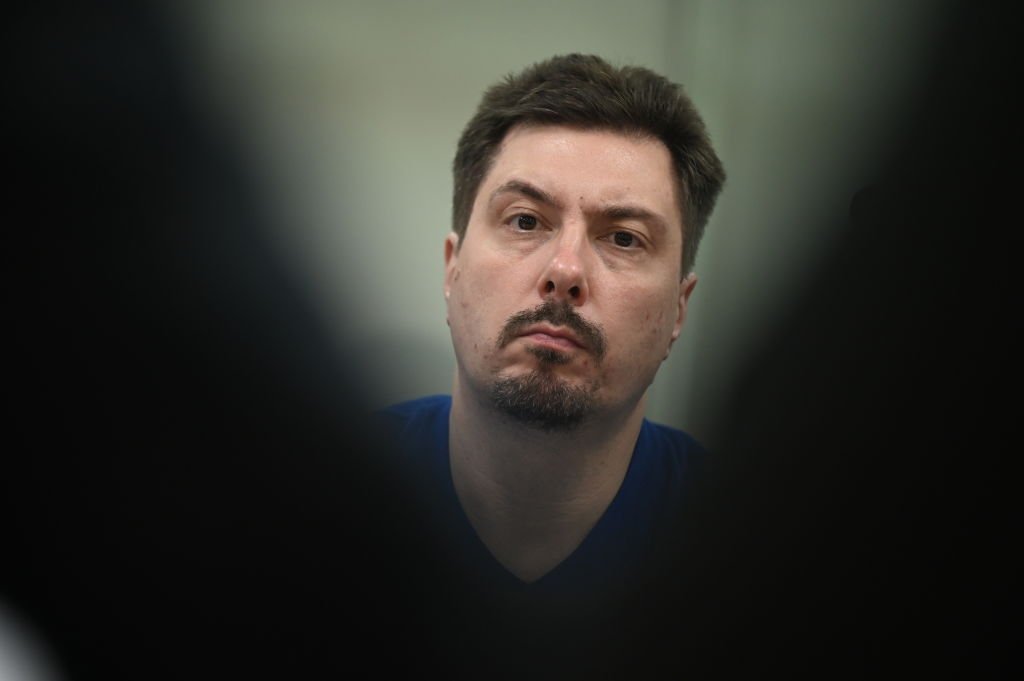 |
Former supreme court judge Vsevolod Kniaziev, who stands accused of having received a bribe of more than £2 million,
appears at a court hearing in May 2023 in Kyiv
Viacheslav Ratynskyi / Anadolu Agency via Getty Images
What’s happening with the Supreme Court?
In 2016, the Supreme Court and other higher specialized courts were liquidated by parliament. For the first time in Ukraine’s history, an open selection process was used for Supreme Court judges (rather than direct appointments), in 2017 and again in 2019. This affected around 200 judges in total.
However, civil society organizations claimed that the reboot of the Supreme Court was a failure, as many of the newly chosen judges received a negative evaluation from the country’s Public Integrity Council. Last September, six months after Russia’s invasion, journalists reported Bohdan Lvov, the Supreme Court’s deputy chair, had failed to declare assets in Russia, sparking a NABU investigation. Lviv told journalists at the time the investigation was an attempt to discredit him.
NABU and SAP have also issued proceedings against the former head of the Ukrainian state fiscal service, Roman Nasirov. NABU said in a statement that its six-year investigation, concluded this February, established that in 2015-16 Nasirov and his former adviser “received illegal benefits to the amount of $5.5m [around £3.6m] and more than 21 million euros [around £15m] of illegal benefits for VAT (value added tax) refunds to agricultural holding companies”. Nasirov has stated that he is completely innocent and intends to prove it in court.
“This case involves the largest documented [alleged] bribe in Ukraine’s history – which still needs to be proven in court,” said Valko.
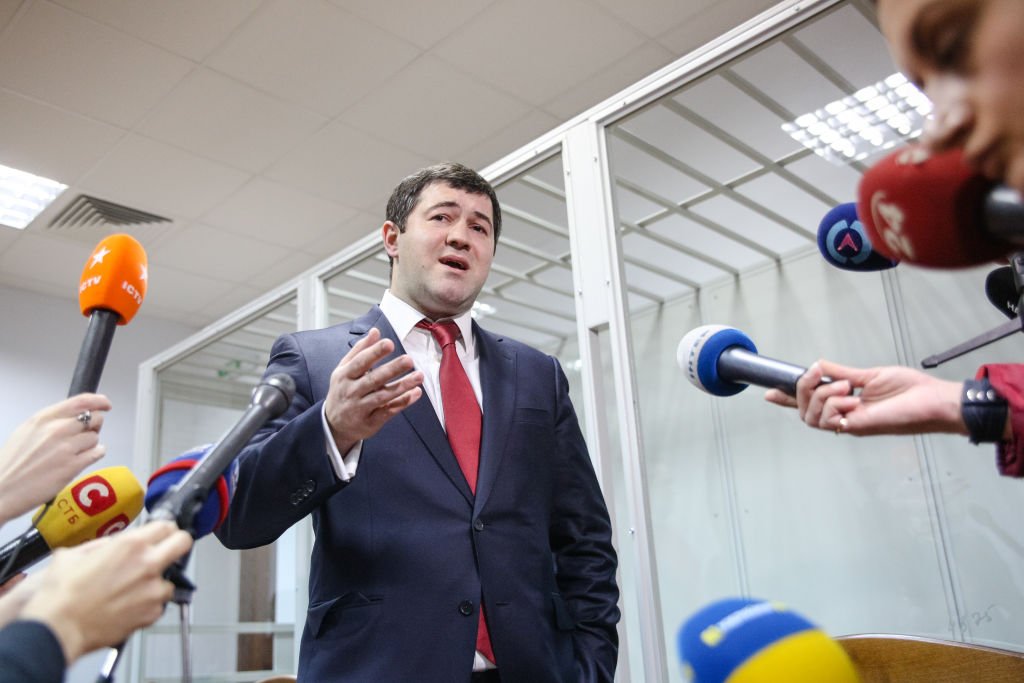 |
Roman Nasirov, who stood accused of having embezzled more than £58 million, appears in a courtroom in Kyiv, in March 2017
Sergii Kharchenko / NurPhoto via Getty Images
NABU and SAP are also looking at wartime corruption. One such case focuses on Vasyl Lozynskyi, the ex-deputy minister of the development of communities and territories of Ukraine. SAP alleges that Lozynskyi helped arrange contracts with a company that sold diesel and gas generators and other equipment at inflated prices, in exchange for a bribe of $400,000. Lozynskyi denies the accusations against him.
According to Valko, “The investigation is still ongoing, but this is an important case, which concerned a deputy minister in power at the time.”
Valko added that Lozynskyi was fired immediately after being detained, which shows that “reputation as [a social] institution is finally emerging in Ukraine”.
Why are these reforms taking place now?
The European Union has established seven steps Ukraine should take before its application for EU membership is considered. As of June, two of these steps have been completed, according to Olivér Várhelyi, the European commissioner for enlargement.
One of these successful steps is Ukraine’s judicial reform: the creation of the High Council of Justice and the High Qualification Commission of Judges. Várhelyi also noted that “significant progress has been made” in the reform of Ukraine’s Constitutional Court.
Ukraine still has to hold a new competitive process for choosing five new judges for the Constitutional Court. This would guarantee that judges are not political appointments and that their qualifications and integrity are properly checked.
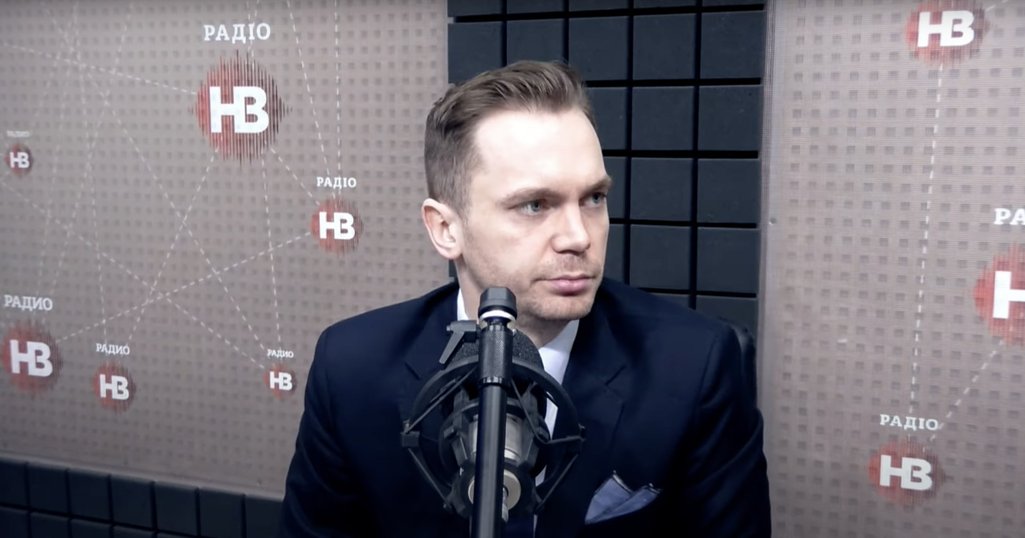 |
Mykhaylo Zhernakov, from the DEJURE Foundation, discussing the Ukrainian judicial reform on the radio
Radio NV
But, Mykhaylo Zhernakov from the DEJURE Foundation, an NGO advocating for judicial reform in Ukraine, warned there are signs that the “political power” in Ukraine is interested in making the Constitutional Court dependent on the Office of the President, contradicting the impartiality and independence of the selection process.
“If the government receives full control over the Constitutional Court, this means that no one will limit the government's actions,” says Zhernakov, noting that the Court will consider such vital issues as integration with the EU and NATO, the return of territories occupied by Russia, but also Ukraine’s likely upcoming presidential, parliamentary and even local elections.
While the Council of Europe’s Venice Commission consults Ukraine on judicial reform, Zhernakov is concerned the commission “either doesn’t want or simply cannot understand [...] certain important nuances” in Ukraine.
“[The Venice Commission] sits down at the negotiating table together with the European Commission and representatives of our dominant political power and decides how things should be, mixing the issues of war and reforms... And there the [Venice] commission... gives Ukraine ‘discounts’ on the quality of reforms.”
Open Democracy
Comments